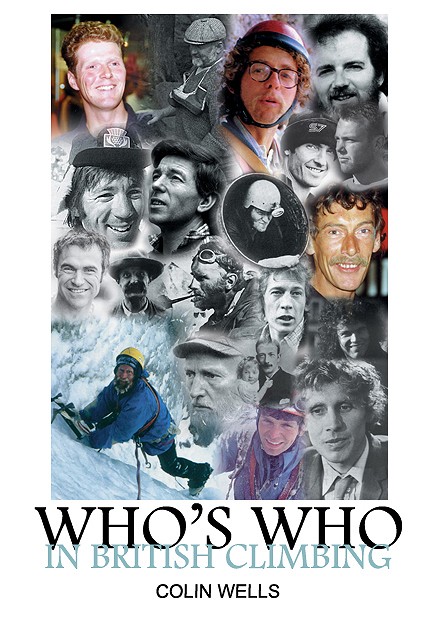
Who's Who in British Climbing
Bite-sized biographies of dead climbers - and some that are still alive.
'The real ground for reprehension of alpine climbing is that, with less cause, it excites more vanity than any other athletic sport.'
John Ruskin 1850
Details of how to buy a copy of Who's Who in British Climbing are HERE .
As everyone knows, the British invented all the best sports on the planet (e.g. footie, cricket, conkers) and introduced them to the rest of the world, who then proceeded to beat us hollow at them. Climbing is no exception.
Nevertheless, we plucky islanders have continued to pursue an inexplicable obsession with giddy heights. One of the notable by-products of all this enthusiasm has been the continual appearance of remarkable climbing characters. As a consequence, I have spent a stupidly large amount of time over the last five years hanging out in musty libraries, sweet-talking frankly unattractive archivists and illegally photocopying museum documents in order to produce this Very Big Book.
Populating its pages are the romantics, eccentrics and buffoons that have made British climbing what it is: dissolute and hungover most of the time, with the odd unexpected burst of brilliance. They form a world-class cast of eccentrics ranging from the most virtuous to the most hedonistically barbarous characters one could ever hope to meet. Thus at one end of the moral spectrum we have Archdeacon Hudson Stuck solemnly tutoring his native charges on ecclesiastical history while making the first ascent of Denali. While at the other there's Satan-loving Aleister Crowley pleasuring himself in his tent on Kangchenjunga while his helpless avalanched companions were crying for help a few yards away. In between are the usual sprinkling of psychotic nut jobs, consummate show-offs, and infuriatingly brilliant athletes. Indeed, an appropriate alternative title for this tome might be The Good, The Bad and The Ugly. But which are which? Ah, now that would be telling. You, dear reader, must decide.
The selection of folk gracing these pages has been anything but scientifically objective. Instead the intention has been to include anyone who was born in Britain who just happened to do anything interesting or significant anywhere, not just in the UK. Also included is the odd Johnny Foreigner who has made an impact in Britain. For some strange reason the list of this latter category is disappointingly small (hint - it might be something to do with the weather).
The definition of 'significant' is taken to mean either pulling off influential climbs or taking a visionary approach to the sport that changed its course. (Whereas the concept of 'interesting' is left deliberately vague - mainly because I couldn't be arsed to define it). The bottom line is that if a climber's antics are enough to make you laugh, then that's good enough for me. I admit I'm easily pleased. Having said that, there are an awful lot of ghastly, dull, nerdily obsessive people in here as well, simply because they have, infuriatingly, achieved 'significant' climbing feats. You'll be able to tell which these are because you will either fall asleep or get a sudden desire to chew your own fingers off. (If you don't, it probably means you are a boulderer or sport climber. Seek medical treatment immediately.)
Because of this idiosyncratic selection process there will be at least four groups of people who will hate this book:
1) Everyone who is in it.
2) Everyone who isn't in it.
3) Bearded men in comfortable cardigans who attend mountain literature festivals.
4) People who post on internet forums.
I take comfort in the thought that there are probably only a few million of these.
By now it should be clear that WWiBC is by no means an objective historical treatment of the subject. Instead, in its inchoate and ramshackle way, I hope it might give an insight into why the British climbing scene still remains as vibrant today as it clearly was when the whole party kicked off in the Victorian period. And I also hope it might start to explain how its unique style spread beyond these rain-splattered shores to infect the whole world. I leave the last word to one of the 'colonised', Canadian Chic Scott, describing the Rockies' climbing scene:
“To this day the tradition of bold climbing, understatement, iconoclasm and raucous social gatherings initiated by the Brits is still alive amongst the younger generation, many of whom have little idea of where it originated.”
Long may it continue.
Colin Wells
Hope, Derbyshire, March 2008.
You can see Colin Wells' impressive UKClimbing.com Photo Gallery HERE

Comments